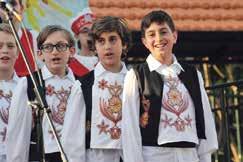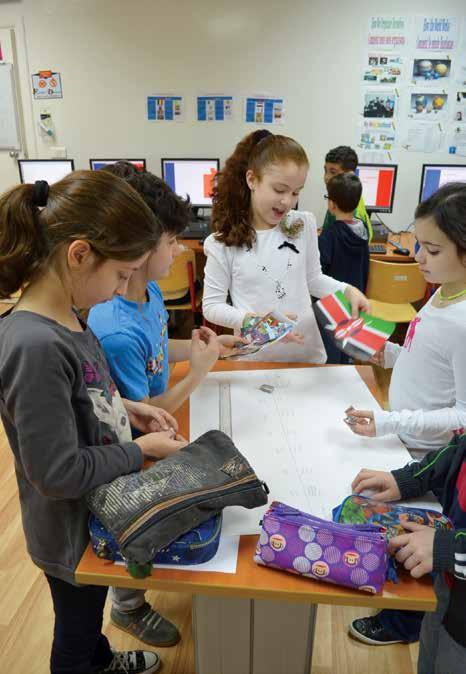
5 minute read
International Day
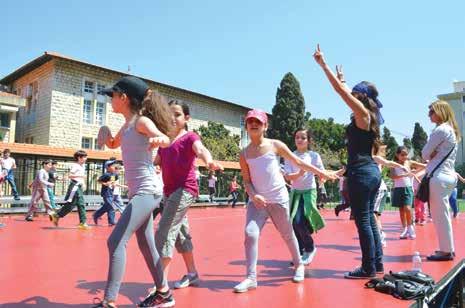
What only started out as an idea eight years ago is now a firm IC tradition which attracts more than 2,000 people every year. Moreover, it has become the social event of the year where the IC family gathers and chats into the early hours of the evening. The basic idea behind International Day is that students of grade 3, CE2, and 1st intermediate, 6ème, from both campuses (Ras Beirut and Ain Aar) not only research every aspect of a selected country but actually try to live the experience as much as possible which includes learning the national song and dance of the country, wearing its national costume and tasting its ethnic food. From the surface, it may all seem like a wonderful show followed by an enjoyable reception. But little does the audience know that, if you dig a little deeper, behind the scenes, hundreds of students, teachers, parents and IC personnel have been working diligently for the past five months for this one important day…
November 2012. Hana Bekdache, the Assistant to the Director at the Ras Beirut Elementary school and Celine Abou Rahal from Ain Aar meet with the International Day committee. The committee is made up of eight Ras Beirut and Ain Aar teachers, chaired by IC President John Johnson. Together they must choose eight countries - one from every continent. This year’s selections were: Kenya, Jamaica, Belgium, Mauritius, Mexico, Egypt, Hungary and Sri Lanka. There are many details to iron out and many people to coordinate with. Books on the selected countries are ordered. In only four months, teachers and students will start their research. Music teachers are immediately notified. It is now up to them not only to research the traditional songs and dances of the countries but to teach it to their students. Traditional costumes for 450 students must be sewn. Parents will be asked to help out. The physical plant personnel – around 40 of them – will be brought into the fold. The scouts must be notified. Certain jobs must

Mishka Mourani, Hana Bekdache, Celine Abou Rahal
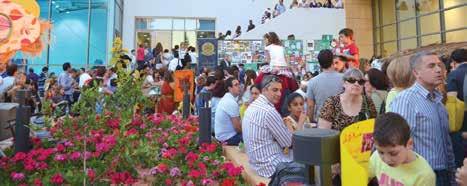
be outsourced. What mistakes were done last year? The committee goes over them to make sure they are not repeated. Yes, there is a lot to do. International Day is only 178 days away. The work begins.
February 2013. About 30 parents, heeding the calls of teachers to help out in the preparations, show up to the first meeting. “We need your help,” explains Bekdache, “We can’t do this alone.” Parents are divided and groups created: some will help students with their research (culture, history, tourism, climate, food, customs, etc.) and others will arrange and man the stands as well as provide the feasts. “But parents, please remember not to go over the top,’ continues Bekdache. “Keep it simple but creative.”
March 2013. Parents show up ready to work with students for three hours a day for a full week. Parents and students delve into the library and internet. Before long, the countries captivate both adults and children. Passersby would find mothers and children enthusiastically creating posters and displays. A few weeks later …. Group by group, students present their findings. Some memorized the facts, some put on a play and some created PowerPoint displays. All were brilliant. Teachers smile in relief. Their charges have certainly learned much about ‘their’ countries. Meanwhile, music teachers are busy teaching the songs and choreographed dances to the students. A difficult task. The songs are in the countries’ language. Students have to memorize them and learn the dance steps in unison. The music and lyrics are sent home. Would parents please familiarize their kids with the music and help them memorize all the foreign words?
April 2013. Invitation cards, prepared by Abou Rahal, are sent out to parents. Costumes are ready and sent home. Some turn out to be too big or too small. They are sent back for quick alterations. Work to set up the 8 x 20 meter stage on the green football field begins. With the Rockefeller building in the background, the stage is breathtaking. The flowers are in full bloom. IC campus is at its full glory. Rehearsals can now be held on stage. Abou Rahal sets up a schedule. For the next few days, the voices of singing children are heard all around the neighborhood. No one complains. In the midst of the country’s political squabbles and the news of tragic events in nearby countries, it is a welcome respite. Physical plant personnel are at full alert. It is up to them to set up the stands, arrange the seating, clean up the campus, rotate security guards, provide the sound equipment, arrange for 3,000 water bottles to be delivered on campus, provide and clean WCs, etc. The last rehearsal is held. The last stand is set up. Everything is ready.
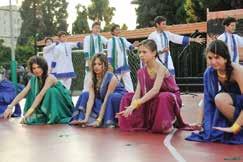
April 27 2013 4:30pm. Students show up in all kinds of colors. They are excited. A bit too excited. Teachers are on hand to calm them down. By 5pm, there isn’t one empty chair to be found. Enthusiastic parents, grandparents, aunts, uncles and siblings, with a sea of cameras, are enthusiastically waiting to see their precious little one on stage. It’s all about to begin. Bekdache is making last minute decisions. If she is nervous, she doesn’t show it and is cheerfully greeting guests. An Honorary Consul shows up late, she quickly gives up her seat and leads him to it. Nothing should go wrong. She hopes. IC Senior Vice President Mishka Mourani takes the stage and welcomes all. Without further ado, the show begins. Group after group take the stage. The children are an instant hit. The songs and dances are performed in sync. The last performance finishes. Bekdache looks decidedly more relaxed. The second part of the International Day begins: the stands and food. For the first time, some stands have been set up in the grounds of the new Elementary school. Parents have outdone themselves: delicious smells waft through the school as feast after feast invites one and all to taste. By 8pm, the crowds begin to dwindle. Parents and their exhausted but happy looking children, still wearing their colorful costumes, make their way out of the campus. It is over. Physical plant personnel begin cleaning up. It was an amazing evening. Monday April 29. Bekdache is standing outside the Elementary school. There is something serene about her. She smiles brightly. “Now I have to think about next year,” she says with only a hint of a worried frown. “We must order the books the students need to read.” And it starts again.
